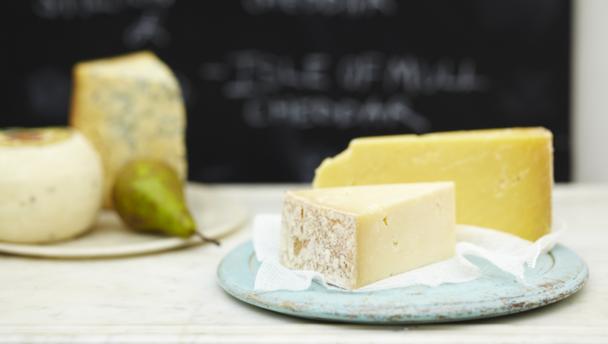

Perhaps the most famous of our native cheeses, Cheddar is now made around the world. Traditional farmhouse examples, such as Montgomery’s and Keen’s, are still made from raw cows’ milk and matured for up to 18 months, giving them a dry, flaky texture and a rich, tangy, often nutty character. Mass-produced examples tend to be aged for much shorter periods, and will have a creamier, moister texture and a milder flavour, but generally melt better when cooked.
A mixture of vegetarian and animal rennets are used, depending on the producer. Cheddar is traditionally made from slabs of curd that are stacked on top of each other, and turned frequently. The pressure of their combined weight squeezes out any remaining whey; the slabs can then be cut into small pieces, salted, and put into moulds for maturing. This process is known as ‘Cheddaring’.
 Macaroni cheese
Macaroni cheese
 Bacon rarebit with apple chutney
Bacon rarebit with apple chutney
 French toast with ham and cheddar
French toast with ham and cheddar
 Brilliant breakfast omelette
Brilliant breakfast omelette
 Cheese and ham omelette
Cheese and ham omelette
 Buckwheat blinis with scrambled eggs and smoked salmon
Buckwheat blinis with scrambled eggs and smoked salmon
 Minced beef pinwheels
Minced beef pinwheels
 Bacon and mature cheddar straws
Bacon and mature cheddar straws
 Double baked cheese soufflés
Double baked cheese soufflés
 Cheese straws
Cheese straws
 Bacon, egg and cheese muffins
Bacon, egg and cheese muffins
 Chickpea flatbreads with tasty toppings
Chickpea flatbreads with tasty toppings
 Multi-seeded wheat-free bread
Multi-seeded wheat-free bread
 Delia's any kind of cheese sauce
Delia's any kind of cheese sauce
 Onion marmalade
Onion marmalade
Cheddar comes in a wide variety of styles, from young and fresh to mature and crumbly. Cheeses labelled as West Country Cheddar must be made from cows reared in Cornwall, Devon, Dorset or Somerset using traditional methods. They must contain no colourings, flavourings of preservatives, and must have been matured on the farm where they were made for at least nine months.
Article by Felicity Cloake
Type the ingredients you want to use, then click Go. For better results you can use quotation marks around phrases (e.g. "chicken breast"). Alternatively you can search by chef, programme, cuisine, diet, or dish (e.g. Lasagne).